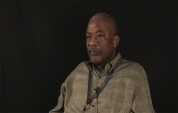9:37 | When you were pinned down by overwhelming enemy fire during a firefight in Vietnam, you called in an airstrike. Unfortunately for Marine Ernest Washington, the wrong coordinates were given and the airstrike came in right on top of his unit.
Keywords : Ernest Washington Operation Calhoun Medivac radio M-75 M-60 dispersing fire Marine coordinates air strike chopper helicopter Silver Star Bronze Star Purple Heart watch

To Ernest Washington, Marine Corps basic training was "12 weeks of football practice." But it became much more serious when the civil rights upheaval of the time spilled over into the military. The beauty of it was the understanding which came from striving together as Marines.
The physical rigors of Parris Island kept race relations cool, says Ernest Washington, but at Camp Lejeune, tensions became physical. The fact that some instructors were still using the "N Word" didn't help anything. It was different when he got to Vietnam.
During his first combat experience, Ernest Washington was so frightened he didn't fire a shot. That never happened again after he received advice from battle hardened vets. If you don't fire, there's a hole in the line and that can't happen.
The shrapnel that tore into Ernest Washington's shoulder came from .50 cal machine gun bullets from the wing guns of a U.S. Phantom jet. This friendly fire led to a wound that didn't cause him much pain initially, but really alarmed him when he looked down and saw the bloody mess.
In Vietnam, Ernest Washington saw the Viet Cong a lot, mostly running away. "They weren't cowards," he says. "They were setting us up." When he was moved further North, he couldn't see the NVA regulars, but he was pinned down a lot by their accurate mortar fire.
Ernest Washington was fortunate to leave Vietnam and serve as an MP in Japan and an instructor at Quantico. After his discharge, he became a veterans advocate and started an organization to help veterans with problems adjusting to civilian life.
He managed to earn a master's degree after the Vietnam War, but Ernest Washington still felt driven to reach out to troubled veterans, such as a friend who lived thirty years on the streets. He can't imagine what it must be like for today's vets serving multiple tours. He barely survived one.